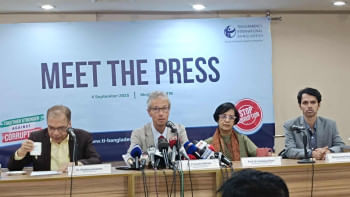LDC graduation: an economic cliff?

As Bangladesh approaches its scheduled graduation from the least developed country (LDC) category in November 2026, a sense of unpreparedness hangs over both the government and the private sector. The milestone represents a recognition of progress on three key United Nations criteria: per capita income, human assets, and economic vulnerability. To qualify for graduation, a country must meet at least two of these three thresholds in two consecutive triennial reviews. Bangladesh has distinguished itself as the first country to achieve all three criteria in both the 2018 and 2021 reviews.
On the income front, Bangladesh's per capita gross national income has reached an estimated $2,684, well above the 2024 graduation threshold of $1,306. Its Human Assets Index, which measures outcomes in health and education, scored 77.5 against a required threshold of 66, reflecting progress in literacy rates and reductions in under-five mortality. The Economic Vulnerability Index, which assesses resilience to shocks, stood at 21.9, comfortably below the threshold of 32. Taken together, these figures underscore the resilience and growth that have made graduation possible. Yet many economists and industry leaders warn that inadequate preparation and the slow pace of reforms could turn this milestone into an economic shock, weakening the country's competitiveness in global value chains.
MA Razzaque, chairman of the Research and Policy Integration for Development (RAPID), has voiced particular concern. He argues that while Bangladesh has earned graduation, the real danger lies in wasted time and lack of urgency. "When it comes to reforms, the pace is painfully slow—and that is where the real risk lies," he said.
There are some steps being taken. According to Anisuzzaman Chowdhury, special assistant to Chief Adviser Prof Muhammad Yunus, a new steering committee is working on policy formulation and identifying bottlenecks in critical areas such as garments, pharmaceuticals, and port operations. The committee meets weekly with industry representatives and makes visits to factories to understand challenges firsthand. Reforms have already yielded some progress: port operations have been streamlined so that pharmaceutical raw materials now clear in days instead of months.
Dormant regulatory bodies, such as the Drug Control Committee, have been revived, and the National Single Window, which links 19 government agencies, has become functional, issuing 40,000 certificates in just two months. Still, Chowdhury acknowledged that these efforts are not sufficient to overcome all the challenges in such a short time. He also noted that cash incentives to exporters, currently a lifeline for many, may not be permissible under World Trade Organisation rules once Bangladesh graduates, making it necessary to design new indirect incentives.
The greatest concern remains the loss of preferential trade benefits that have underpinned the country's export-led growth. At present, 73 percent of Bangladesh's exports enjoy duty-free access to 38 countries under the LDC framework. Nowhere is this advantage more important than in the European Union, which alone accounts for 48 percent of Bangladesh's exports. Graduation threatens to bring an abrupt end to these preferences.
While there will be a three-year transition period in the EU and the UK, tariffs could rise to between 9.6 percent and 12 percent in the EU by 2029, 16 percent and 18 percent in Canada, and 7.4 percent and 12.8 percent in Japan. Economists estimate that the combined effect could reduce annual exports by as much as $8 billion, roughly 14 percent of total exports.
To mitigate these risks, the government has introduced the Smooth Transition Strategy (STS), a comprehensive plan with five strategic pillars and 157 actions. The plan has received praise from the UN Committee for Development Policy for its scope and ambition.
Yet, implementation has been slow. Razzaque points out that without a robust accountability framework, reform inertia will persist, leaving the STS as little more than words on paper. He argues that Bangladesh is not yet in a position to absorb the blows of lost preferential tariffs and subsidies, and that reducing the cost of doing business is essential if exporters are to find any competitive edge from within. He insists that securing trade agreements and qualifying for the EU's GSP Plus scheme are no longer optional but essential for survival. Intellectual property rights protection is another neglected area where Bangladesh could easily be caught unprepared, leaving local businesses at risk.
Progress on trade agreements has been particularly disappointing. Securing preferential access is a core element of the STS, yet little has been achieved in practice. Bangladesh has signed only one preferential trade agreement, with Bhutan in 2020. Negotiations with key partners, such as India, Japan, South Korea and China are ongoing, but none have yet resulted in a deal. Japan has even stated that it will only sign an Economic Partnership Agreement after Bangladesh graduates, leaving the country exposed during the critical transition. At the same time, efforts to secure GSP Plus status in the EU remain bogged down in compliance requirements on labour rights, governance, and environmental standards.
The impacts of graduation will be felt unevenly across sectors. For the garment industry, which makes up more than 80 percent of the country's exports, the EU's three-year transition period under GSP Plus offers a small but crucial window to diversify markets and comply with new standards.
The pharmaceutical sector, however, faces an immediate shock. Under the WTO's TRIPS agreement, LDCs currently enjoy a waiver that allows them to manufacture patented medicines without registering them. After graduation, this flexibility will end, requiring local companies to register all patented drugs. The process is costly and time-consuming, and could result in significantly higher medicine prices.
Tapan Chowdhury, managing director of Square Pharmaceuticals, has warned that the country needs business readiness rather than simply celebrating the graduation milestone. Abdul Muktadir, president of the Bangladesh Association of Pharmaceutical Industries, has added that the industry, which has only recently begun producing its own raw materials, requires at least two additional years to prepare.
With time running short, groups such as the International Chamber of Commerce-Bangladesh are preparing to formally request a deferment of graduation to allow more time for preparation.
Razzaque of RAPID has summed up the situation candidly. "Preparations for graduation have been quite limited, with both the government and the private sector falling behind," he said. For Bangladesh, the achievement of graduation is real and significant, but unless urgent reforms are undertaken, the transition could well resemble an economic cliff.

 For all latest news, follow The Daily Star's Google News channel.
For all latest news, follow The Daily Star's Google News channel. 






Comments